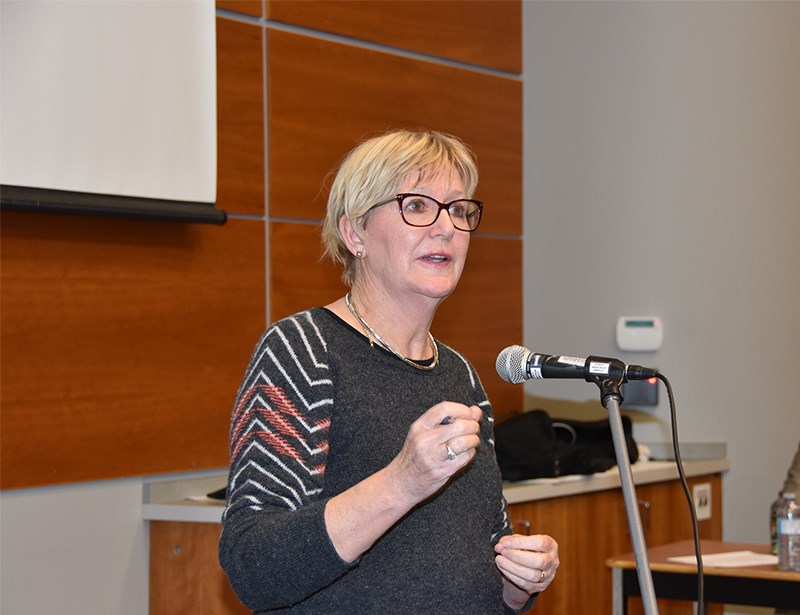Proportional representation is either the universal suffrage issue of the 21st century or a risky venture that will destroy democracy in B.C., according to two views presented Wednesday at a discussion at Douglas College's Coquitlam campus.
The debate — featuring Antony Hodgson, president of Vote PR BC, and Suzanne Anton, director of the No BC Proportional Representation Society — took place as British Columbians began receiving ballots to vote on whether to change the province’s voting system to proportional representation (PR) from the traditional first past the post system (FPTP).
Sponsored by the Tri-Cities Chamber of Commerce — although the local business advocacy group has yet to take a position on the referendum question — the debate attracted about 100 people who were either on one side or the other, or who came to learn.
“Teachers vote and we need to give them tools to make an informed decision,” said Coquitlam Teachers’ Association president Ken Christensen, who attended the meeting and took notes.
For most attendees, though, the presentations were a high-level debate about two forms of voting in MLAs and an opportunity to get a broad view of what would change under PR and whether the current FPTP system is better.
“We believe public policy should reflect the will of all voters,” said Hodgson, who was among the participants in the citizens assembly that recommended proportional representation in 2005.
He said the Canadian Charter guarantees the right to vote but many people are excluded when the MLA they voted for doesn’t get into power.
‘This is fundamentally a civil rights issue. It is the suffrage question of the 21st century,” Hodgson said.
But Anton warned that under PR, the link between MLA and voters would be lost because parties are voted based on their provincial share of the vote, and while some MLAs would be locally chosen, others would be chosen from lists.
“They don’t need to be of your political persuasion to take your concerns to Victoria. Keep that direct relationship between you and the MLA you send to Victoria," Anton said.
She said proportional representation may have worked in Europe for a while but is now breaking down because larger parties are fragmenting based on issues, and it’s taking months for coalitions to form to run government.
“Can you see the BC NDP and the Liberals holding hands? We have an adversarial system, which is a very good system,” Anton said, warning that extremist parties could come to power power under PR. “We don’t want to invite that into B.C."
Hodgson said Anton’s claim that PR is only about party politics is a “gross mischaracterization” because under proportional representation, voters would still vote for specific candidates.
The discussion got heated briefly, with both charging each other with representing partisan interests, a claim each refuted.
Questioners, meanwhile, wanted to know which system would be good for business and the economy, and how voter participation would be affected by a change, among other things.
Hodgson said the current system “exacerbates tensions in B.C. society,” noting that participation rates typically rise under PR because, under such a system, “every vote will count” He also said countries under PR do better on economic and social indexes than majority governments elected via FPTP.
Anton said the current system ensures stability and economic certainty while PR systems tend to cost more because parties have to make deals to work together.
Meanwhile, voters who are wondering if they’ll get their referendum package in the mail or what to do with it after during the rotating postal strike can visit the local referendum office at Eagle Ridge Plaza (corner of Guildford and Lansdowne in Coquitlam), which will open Nov. 5.
“If you do not have it [your referendum package] by Nov. 10 or 11, come in and pick one up. You can vote right in the office if you want and we’ll courier it to Victoria,” said Julie Brassington, Election BC district electoral officer.
Ballots being mailed to voters from now until Nov. 2 can be mailed or dropped off but any received in Victoria after 4:30 p.m. Nov. 30, the referendum deadline, will be disqualified.



